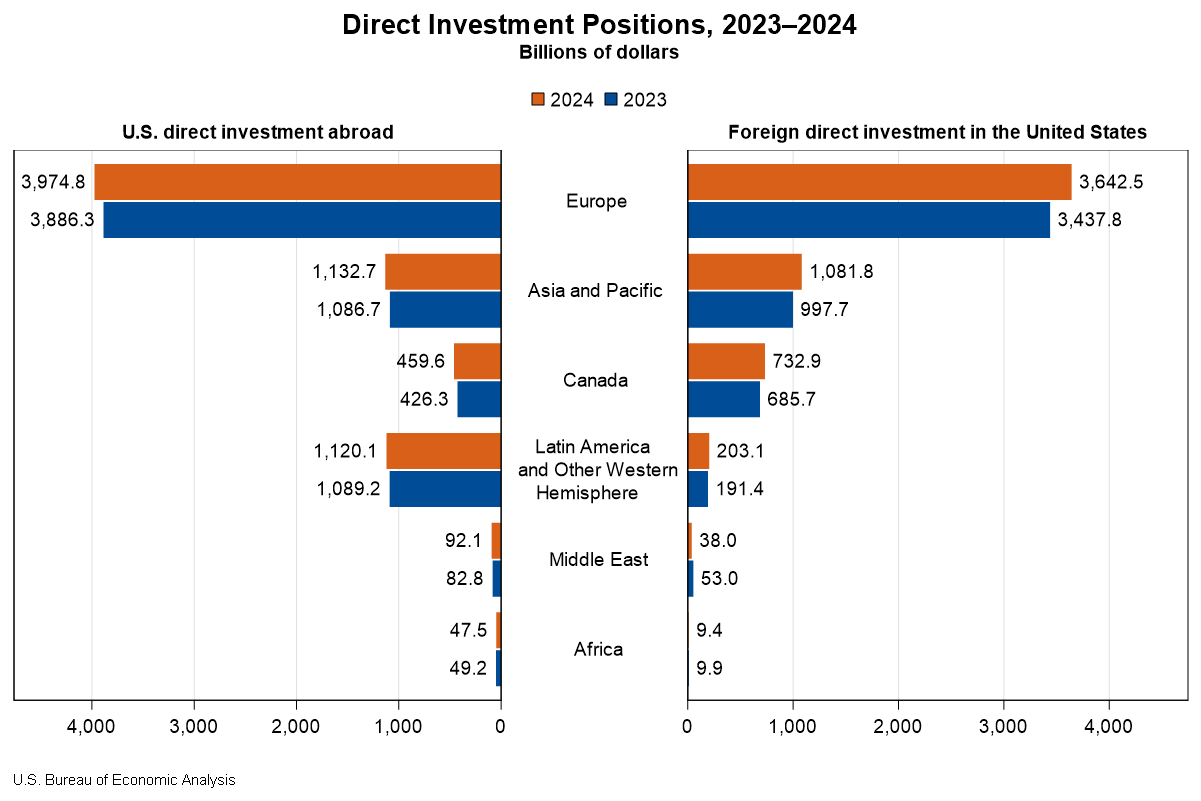Bureau of Economic Analysis
Direct Investment by Country and Industry, 2024
The U.S. direct investment abroad position, or cumulative level of investment, increased $206.3 billion to $6.83 trillion at the end of 2024, according to statistics released today by the U.S. Bureau of Economic Analysis. The increase was led by an $88.4 billion increase in the position in Europe, primarily in Luxembourg and Germany. By industry, manufacturing affiliates had the largest increase, led by manufacturing of computers and electronic products.
The foreign direct investment in the United States position increased $332.1 billion to $5.71 trillion at the end of 2024. The increase was led by a $204.7 billion increase in the position from Europe, which reflected a $52.9 billion increase from the United Kingdom and a $39.7 billion increase from Germany. By industry, affiliates in manufacturing increased the most.
Principal Federal Economic Indicators
Noteworthy
- 2025 News Release Schedule
- Innovation at BEA
- 2025 Annual Updates
- New! Services Trade Data for More Countries
- Data Tool: Trade in Value Added
- Distribution of State Personal Income
- Updated: RIMS II Regional Multipliers
- Arts and Culture
- Space Economy
- FDI Now in State BEARFACTS
- Quick Guide: Price Indexes
The Latest
U.S. Current-Account Deficit Decreases in Second Quarter 2016
The U.S. current-account deficit decreased to $119.9 billion (preliminary) in the second quarter of 2016 from $131.8 billion (revised) in the first quarter of 2016. As a percentage of current-dollar U.S. GDP, the deficit decreased to 2.6 percent from 2.9 percent. The previously published current-account deficit for the first quarter was $124.7 billion.
U.S. International Transactions, 2nd quarter 2016
Current Account Balance The U.S. current-account deficit decreased to $119.9 billion (preliminary) in the second quarter of 2016 from $131.8 billion (revised) in the first quarter of 2016, according to statistics released by the Bureau of Economic Analysis (BEA).
Travel and Tourism Spending Accelerated in the Second Quarter
Real Tourism Spending. Real spending on travel and tourism accelerated in the second quarter of 2016, increasing at an annual rate of 4.7 percent after increasing 1.2 percent (revised) in the first quarter, according to new statistics released by the Bureau of Economic Analysis.
Travel and Tourism Satellite Accounts, 2nd quarter 2016
Real spending (output) on travel and tourism accelerated in the second quarter of 2016, increasing at an annual rate of 4.7 percent after increasing 1.2 percent (revised) in the first quarter according to new statistics released by the Bureau of Economic Analysis. By comparison, real gross domestic product (GDP) increased 1.1 percent in the second quarter after increasing 0.8 percent in the first.
Security Measures Keep Data Locked Tight Until the Time Is Right
U.S. gross domestic product is among the world’s most closely watched numbers, an economic indicator that moves markets, makes headlines and affects countless government and private decisions.
July 2016 Trade Gap is $39.5 Billion
The U.S. monthly international trade deficit decreased in July 2016 according to the U.S. Bureau of Economic Analysis and the U.S. Census Bureau. The deficit decreased from $44.7 billion in June (revised) to $39.5 billion in July, as exports increased and imports decreased. The previously published June deficit was $44.5 billion. The goods deficit decreased $5.3 billion in July to $60.3 billion. The services surplus decreased $0.1 billion in…
U.S. International Trade in Goods and Services, July 2016
U.S. Census Bureau U.S. Bureau of Economic Analysis NEWS U.S. Department of Commerce * Washington, DC 20230 U.S. INTERNATIONAL TRADE IN GOODS AND SERVICES July 2016 The U.S. Census Bureau and the U.S. Bureau of Economic Analysis, through the Department of Commerce, announced today that the goods and services deficit was $39.5 billion in July, down $5.2 billion from $…
Spending on Durable Goods Rises in July
Personal income increased 0.4 percent in July after increasing 0.3 percent in June. Wages and salaries, the largest component of personal income, increased 0.5 percent in July, the same increase as in June.
Personal Income and Outlays, July 2016
Personal income increased $71.6 billion (0.4 percent) in July according to estimates released today by the Bureau of Economic Analysis. Disposable personal income (DPI) increased $60.1 billion (0.4 percent) and personal consumption expenditures (PCE) increased $42.0 billion (0.3 percent). Real DPI increased 0.4 percent in July and Real PCE increased 0.3 percent. The PCE price index was unchanged from June.
Gross Domestic Product Second Quarter of 2016 (Second Estimate)
Real gross domestic product (GDP) increased 1.1 percent in the second quarter of 2016, according to the “second” estimate released by the Bureau of Economic Analysis. The growth rate was 0.1 percentage point less than the “advance” estimate released in July. In the first quarter, real GDP rose 0.8 percent.




